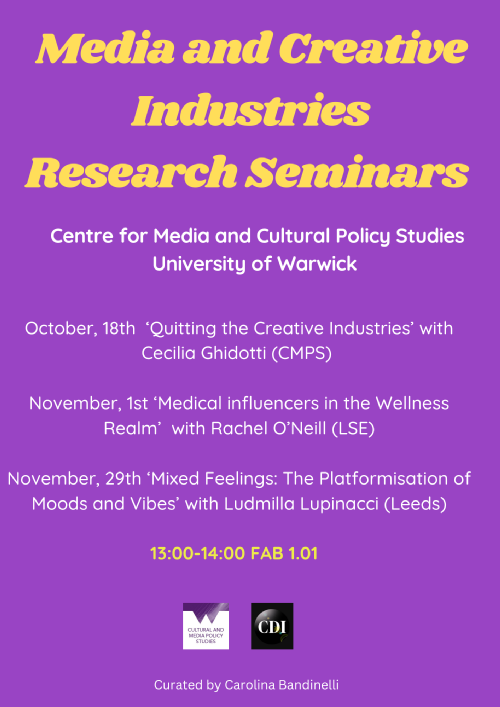News & Events
Richard Rogers, Post-Truth Spaces: Studying Authenticity and Influence on the Internet
Public Lecture
This talk seeks to contribute to the study of authenticity and influence on the internet by exploring a series of techniques for the examination of online spaces where actors and information are either difficult to authenticate and verify or are known to verification specialists and fact checkers as problematic. Such online realms we refer to as post-truth spaces, which references the rise of the discourse of ‘alternative facts’, especially as part of a counter-program for ‘asserting political dominance’ and influence. The contribution is methodological as well as conceptual. In the technique I locate and discuss clutches of actors and websites as well as social media posts grouped together on the basis of their dense inter-referencing and their verification assessment based on digital investigation techniques. Their influence is gauged by the extent to which they penetrate or overlap onto mainstream spaces online. Conceptually, the post-truth space is among other spaces where ‘problematic information’ holds sway and information circulation, campaigning and operations are undertaken. Among these are the ‘alternative influence network’, ‘fake news’ engagement spaces, coordinated inauthentic behaviour campaigns as well as participatory propaganda circulation. As with a post-truth space, which as I discuss is a broader term, each of these is mapped through techniques that demarcate, chart or otherwise render them as spaces of interest online.
Date: Monday, 11/03/2024; Time: 17:00-19:00; Room: OC1.09.
Media and Creative Industries Research Seminars Series - CDI @ Warwick's Centre for Cultural and Media Policy Studies (Winter Term)

Narratives from the creative sector often center on those who, despite the challenges, manage to keep going and eventually thrive in the cultural sector or as creative professionals. The focus on quitting brings under the spotlight the others, those who, after a series of attempts at staying in the creative industries, left the sector. This presentation centers on the case of Italian graduates from a creative writing program, and it investigates their biographies and reasons for quitting. It argues that in their cases, quitting depended on a set of expectations about the meanings and practices of work in culture and on their refusal to adhere to a series of implicit rules that they had to conform to if they wanted to stay in the publishing industry.
October, 18th - 13:00 - 14:00 FAB 1.01
Medical Influencers in the Wellness Realm: Lifestyle Expertise and the Wuestion of Credentials - Rachel O'Neill (LSE)
Existing literature on wellness influencers takes for granted that such individuals lack accredited expertise, and further contends that their popularity indexes widespread public distrust in experts generally and medical professionals especially. These arguments overlook the existence of medical doctors who are themselves wellness influencers — who share dietary and lifestyle advice on social media, participate in industry trends and conventions, and monetise their followings through sponsored content and other commercial ventures. In this talk I introduce the figure of the medical influencer or ‘medfluencer’ as an object of critical enquiry, using a series of case study subjects from the UK context. Demonstrating the extent to which such individuals reproduce rather than resolve the tensions said to characterise their unaccredited counterparts, I argue that credentials are not in themselves sufficient to undo the problematics associated to wellness influencing and, moreover, may open out new realms of conflict and contradiction.
November 1st, FAB 1.01 13:00 - 14:00
Mixed Feelings: on the Platformisation of Moods and ‘Vibes’ - Ludmilla Lupinacci (Leeds)
Over the past few years, digital platforms have increasingly tailored their content to both respond to and create certain moods, vibes, atmospheres or ambiences (Roquet 2016). This trend has indeed begun to spark discussion on whether platforms such as TikTok represent the end of ‘social media’ as we know it, as the centrality of networks and interpersonal interactions is replaced by self-indulgent activities such as mindless scrolling. Engaging with those debates, in this presentation I will offer a critical assessment of social media’s current experiential turn and its specificities, and propose a critical-phenomenological framework for the theorisation of this ongoing shift precisely at the intersection of embodied affect and the political economy of platformisation. I take moods, ‘vibes’ and their mediation to be both foundational to embodied experience and yet deeply embedded in socio-technical and material practices (Highmore 2013). In this regard, this presentation also aims to engage with a discussion on how, through processes of datafication, personalisation, standardisation, and algorithmitisation (Stark 2020) bodily states such as moods become practices that can be managed through social media once those technologies become central to contemporary ‘regimes of sensory calibration’ (Starosielski 2021).
November, 29th 13:00 - 14:00 FAB 1.01
